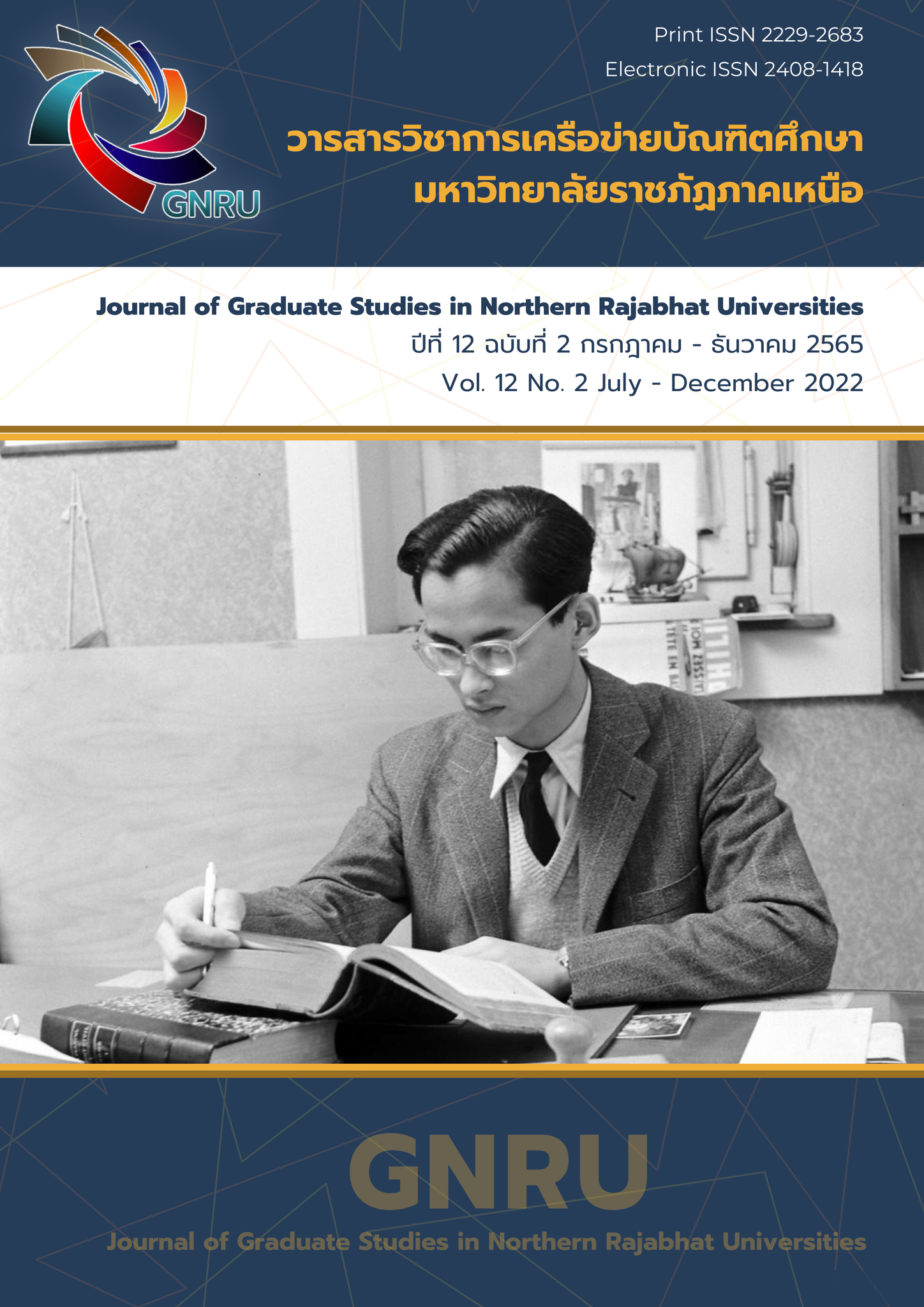DEVELOPING MEASUREMENT AND ASSESSMENT SCALE OF EARLY CHILDHOOD’S BRAIN SKILLS IN CHILD DEVELOPMENT CENTER UNDER THE LOCAL ADMINISTRATIVE ORGANIZATION OF KROK PHRA DISTRICT, NAKHON SAWAN PROVINCE
Main Article Content
Abstract
The purpose of this research was to develop the measurement and assessment scale of the EF brain skill of early childhood students in a child development center. The research subjects consisted of 1) the parents of early childhood students in child development center, 2) students with experiences or research concerning EF brain skill of early childhood students, 3) teachers from child development center, 4) 3 healthcare workers whose work related to early childhood students, and 5) early childhood students in child development center under Krok Phra local administrative organization, Nakhonsawan province. The research instruments were 1) interview form for the person involved to collect basic information to develop the measurement and assessment scale, 2) Validity of the measurement and assessment scale of the EF brain skill of early childhood students’ evaluation form for experts, 3) early childhood students’ performance observation form. The basic information was analyzed using mean, standard deviation, and content analysis. The quality determination of the measurement and assessment scale used Rater Agreement Index: RAI to analyze the validity and reliability. The research found that the measurement and assessment scale of the EF brain skill of early childhood students in child development center was the performance-based assessment with 4 quality levels consisted of 9 keys of executive function, 43 indicators with validity between 0.60-1.00 and reliability using Rater Agreement Index: RAI between 0.838-0.941.
Article Details
References
between Cognitive and Behavioral Measures of Executive Function with Brain Disease.
Child Neuropsychology, 8(4), 231-240.
Anuruthwong, U. (2012). How to Thinking Skills Develop. Bangkok: Innon. [In Thai].
Banich, M. T. (2009). Executive Function: The Search for an Integrated Account.
Association for Psychological Science, 18(2), 89-94.
Bigler, E. D., Howieson, D. B. Lezak, M. D., &Tranel, D. (2012). Neuropsychological
Assessment (5thed.). New York: Oxford University Press.
Burry-Stock, A.J., Shaw, G.D., Chissom, S.B. and Laulie, C. (1996). Rater Agreement Indexes for
Performance Assessment. Educational and Psychological Measurement, 56(2), 251-262.
Cooper-Kahn, J., and Foster, M. (2013). Boosting executive skills in the classroom: A practical guide
for educators. San Francisco: Jossey-Bass
Cryan, J.R. and Others. (1992). Success outcomes of full-day kindergarten: More positive behavior
and increased achievement in the years after. Early Childhood Research Quarterly. Volume 7(2), 187-203.
Chularut, P., Aeamtussana, T., Na Ayudhaya, K.P. (2519). Construction of Executive Function
Inventory for Adolescent Students of Junior High School Level. Social Sciences Research
and Academic Journal, 14(3), 47-62. [In Thai].
De Groef, A. and Others. (2017). Inter-rater reliability of shoulder measurements in middle-aged
women. Physiotherapy, 103(2), 222-230.
Gilbert, S. J., & Burgess, P. W. (2008). Executive Function. Current Biology, 18(3), 110-114.
Hallgren, K. A. (2012). Computing inter-rater reliability for observational data. Tutorials in
Quantitative Methods for Psychology, 8(1), 23-34.
Hughes, C., & Ensor, R. (2005). Executive Function and Theory of Mind in 2 Year Olds: A Family
Affair? Developmental neuropsychology, 28, 645-668
Monette, S., Bigras, M., & Claude Guay, M. (2011). The Role of the Executive Functions in 276
School Achievement at the End of Grade 1. Journal of Experimental Child Psychology,
109(2), 158-173.
Muangthong, W., Kaewurai, W. Onthanee A. & Juntakun, J. (2020). Using Executive Function to
Enhance Reasoning Thinking of Preschool Children: What Teachers Should not Overlook.
Ratchaphruek Journal, 18(1), 20-28. [In Thai].
Rovinelli, R. J., & Hambleton, R. K. (1977). On the use of content specialists in the assessment of
criterion referenced test item validity. Dutch Journal of Educational Research, 2, 49–60.
Shaul, S., & Schwartz, M. (2014). The Role of the Executive Functions in School
Readiness among Preschool-Age Children. Springer Science, 27(2014), 749-768.
Thai Health Promotion Foundation (ThaiHealth) & RLG Institute. (2018). The manual
of EF Brain Skills Executive Functions from conception to 3 years.
Bangkok: Aksornthai Printing LTD. [In Thai].
Wenner, C. J., Bianchi, J., Figueredo, A. J., Rushton, J. P., & Jacobs, W. J. (2013). Life
history theory and social deviance: The mediating role of executive
function. Intelligence, 41(2), 102-113.
Wiebe, S. A., Espy, K. A., & Charak, D. (2008). Using Confirmatory Factor Analysis to
Understand Executive Control in Preschool Children: I Latent Structure.
Developmental Psychology, 44, 575-587.


